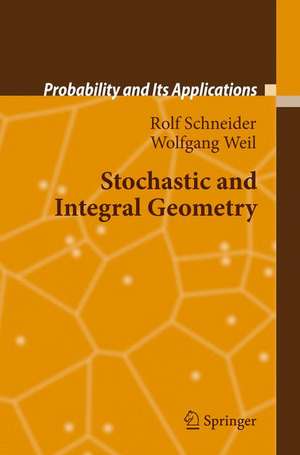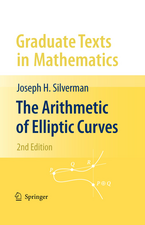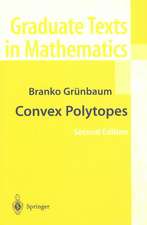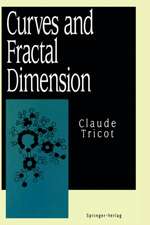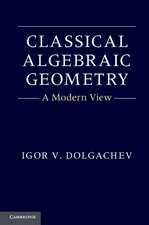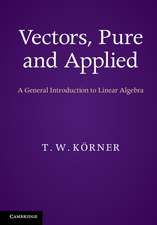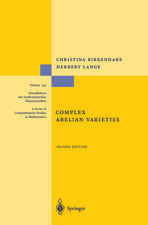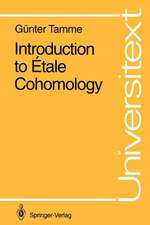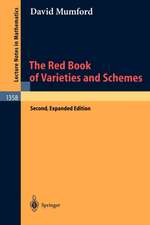Stochastic and Integral Geometry: Probability and Its Applications
Autor Rolf Schneider, Wolfgang Weilen Limba Engleză Hardback – 8 sep 2008
| Toate formatele și edițiile | Preț | Express |
|---|---|---|
| Paperback (1) | 909.47 lei 6-8 săpt. | |
| Springer Berlin, Heidelberg – 25 noi 2010 | 909.47 lei 6-8 săpt. | |
| Hardback (1) | 915.79 lei 6-8 săpt. | |
| Springer Berlin, Heidelberg – 8 sep 2008 | 915.79 lei 6-8 săpt. |
Din seria Probability and Its Applications
-
 Preț: 392.60 lei
Preț: 392.60 lei -
 Preț: 395.09 lei
Preț: 395.09 lei - 18%
 Preț: 739.00 lei
Preț: 739.00 lei - 18%
 Preț: 783.35 lei
Preț: 783.35 lei - 15%
 Preț: 640.24 lei
Preț: 640.24 lei - 18%
 Preț: 948.47 lei
Preț: 948.47 lei -
 Preț: 391.99 lei
Preț: 391.99 lei - 18%
 Preț: 1399.43 lei
Preț: 1399.43 lei - 15%
 Preț: 471.21 lei
Preț: 471.21 lei - 20%
 Preț: 569.10 lei
Preț: 569.10 lei - 15%
 Preț: 691.08 lei
Preț: 691.08 lei -
 Preț: 385.08 lei
Preț: 385.08 lei - 18%
 Preț: 1123.19 lei
Preț: 1123.19 lei -
 Preț: 393.52 lei
Preț: 393.52 lei - 15%
 Preț: 646.62 lei
Preț: 646.62 lei -
 Preț: 461.65 lei
Preț: 461.65 lei - 18%
 Preț: 787.91 lei
Preț: 787.91 lei - 15%
 Preț: 702.41 lei
Preț: 702.41 lei - 15%
 Preț: 557.27 lei
Preț: 557.27 lei -
 Preț: 382.36 lei
Preț: 382.36 lei - 18%
 Preț: 1120.99 lei
Preț: 1120.99 lei - 18%
 Preț: 786.49 lei
Preț: 786.49 lei - 15%
 Preț: 655.78 lei
Preț: 655.78 lei - 18%
 Preț: 785.68 lei
Preț: 785.68 lei -
 Preț: 385.25 lei
Preț: 385.25 lei - 15%
 Preț: 701.90 lei
Preț: 701.90 lei - 18%
 Preț: 1345.87 lei
Preț: 1345.87 lei - 18%
 Preț: 733.65 lei
Preț: 733.65 lei -
 Preț: 384.31 lei
Preț: 384.31 lei - 15%
 Preț: 582.80 lei
Preț: 582.80 lei -
 Preț: 361.42 lei
Preț: 361.42 lei - 15%
 Preț: 709.09 lei
Preț: 709.09 lei - 15%
 Preț: 644.95 lei
Preț: 644.95 lei - 15%
 Preț: 648.24 lei
Preț: 648.24 lei - 18%
 Preț: 897.02 lei
Preț: 897.02 lei - 15%
 Preț: 528.13 lei
Preț: 528.13 lei - 15%
 Preț: 727.59 lei
Preț: 727.59 lei - 15%
 Preț: 470.88 lei
Preț: 470.88 lei - 18%
 Preț: 1001.81 lei
Preț: 1001.81 lei - 18%
 Preț: 954.14 lei
Preț: 954.14 lei -
 Preț: 392.60 lei
Preț: 392.60 lei - 15%
 Preț: 652.31 lei
Preț: 652.31 lei - 18%
 Preț: 1396.43 lei
Preț: 1396.43 lei - 18%
 Preț: 966.15 lei
Preț: 966.15 lei - 18%
 Preț: 1335.93 lei
Preț: 1335.93 lei
Preț: 915.79 lei
Preț vechi: 1116.82 lei
-18% Nou
Puncte Express: 1374
Preț estimativ în valută:
175.23€ • 182.97$ • 144.70£
175.23€ • 182.97$ • 144.70£
Carte tipărită la comandă
Livrare economică 15-29 aprilie
Preluare comenzi: 021 569.72.76
Specificații
ISBN-13: 9783540788584
ISBN-10: 3540788581
Pagini: 708
Ilustrații: XII, 694 p.
Dimensiuni: 155 x 235 x 47 mm
Greutate: 1.16 kg
Ediția:2008
Editura: Springer Berlin, Heidelberg
Colecția Springer
Seria Probability and Its Applications
Locul publicării:Berlin, Heidelberg, Germany
ISBN-10: 3540788581
Pagini: 708
Ilustrații: XII, 694 p.
Dimensiuni: 155 x 235 x 47 mm
Greutate: 1.16 kg
Ediția:2008
Editura: Springer Berlin, Heidelberg
Colecția Springer
Seria Probability and Its Applications
Locul publicării:Berlin, Heidelberg, Germany
Public țintă
ResearchCuprins
Foundations of Stochastic Geometry.- Prolog.- Random Closed Sets.- Point Processes.- Geometric Models.- Integral Geometry.- Averaging with Invariant Measures.- Extended Concepts of Integral Geometry.- Integral Geometric Transformations.- Selected Topics from Stochastic Geometry.- Some Geometric Probability Problems.- Mean Values for Random Sets.- Random Mosaics.- Non-stationary Models.- Facts from General Topology.- Invariant Measures.- Facts from Convex Geometry.
Recenzii
From the reviews:
“In ‘Stochastic and Integral Geometry,’ R. Schneider and W. Weil give priority to the basic concepts in stochastic geometry … while keeping from integral geometry only what is relevant for applications in stochastic geometry. … Each chapter section is concluded by notes in which the main references are cited and numerous possible extensions are discussed. … Stochastic and Integral Geometry is a profound work by two eminent specialists which is essential reading for those willing to learn deep theory.” (Pierre Calka, Mathematical Geosciences, Vol. 45, 2013)
“This book … provides the systematic and exhaustive account of mathematical foundations of stochastic geometry with particular emphasis on tools from convex geometry. … The thorough and up-to-date presentation in this text makes it an invaluable source for researchers pursuing studies not only in stochastic geometry, but also in convex geometry and various applications … . an absolutely indispensable part of all mathematical libraries. … also beneficial for personal collections of all mathematicians who ever deal with probability measures on spaces of geometric objects.” (Ilya S. Molchanov, Zentralblatt MATH, Vol. 1175, 2010)
“The book presents a number of results that are otherwise scattered among an immense number of research papers and mostly provides full proofs for them. … The most remarkable aspect of the book is the reader-friendly structure and the style in which it has been written. The book is also worth owning not only for those working in stochastic geometry and immediately related fields of theoretical and applied probability and spatial statistics. … This book … will be an essential part of every mathematical library.” (V. K. Oganyan, Mathematical Reviews, Issue 2010 g)
“In ‘Stochastic and Integral Geometry,’ R. Schneider and W. Weil give priority to the basic concepts in stochastic geometry … while keeping from integral geometry only what is relevant for applications in stochastic geometry. … Each chapter section is concluded by notes in which the main references are cited and numerous possible extensions are discussed. … Stochastic and Integral Geometry is a profound work by two eminent specialists which is essential reading for those willing to learn deep theory.” (Pierre Calka, Mathematical Geosciences, Vol. 45, 2013)
“This book … provides the systematic and exhaustive account of mathematical foundations of stochastic geometry with particular emphasis on tools from convex geometry. … The thorough and up-to-date presentation in this text makes it an invaluable source for researchers pursuing studies not only in stochastic geometry, but also in convex geometry and various applications … . an absolutely indispensable part of all mathematical libraries. … also beneficial for personal collections of all mathematicians who ever deal with probability measures on spaces of geometric objects.” (Ilya S. Molchanov, Zentralblatt MATH, Vol. 1175, 2010)
“The book presents a number of results that are otherwise scattered among an immense number of research papers and mostly provides full proofs for them. … The most remarkable aspect of the book is the reader-friendly structure and the style in which it has been written. The book is also worth owning not only for those working in stochastic geometry and immediately related fields of theoretical and applied probability and spatial statistics. … This book … will be an essential part of every mathematical library.” (V. K. Oganyan, Mathematical Reviews, Issue 2010 g)
Notă biografică
Rolf Schneider: Born 1940, Studies of Mathematics and Physics in Frankfurt/M, Diploma 1964, PhD 1967 (Frankfurt), Habilitation 1969 (Bochum), 1970 Professor TU Berlin, 1974 Professor Univ. Freiburg, 2003 Dr. h.c. Univ. Salzburg, 2005 Emeritus
Wolfgang Weil: Born 1945, Studies of Mathematics and Physics in Frankfurt/M, Diploma 1968, PhD 1971 (Frankfurt), Habilitation 1976 (Freiburg), 1978 Akademischer Rat Univ. Freiburg, 1980 Professor Univ. Karlsruhe
Wolfgang Weil: Born 1945, Studies of Mathematics and Physics in Frankfurt/M, Diploma 1968, PhD 1971 (Frankfurt), Habilitation 1976 (Freiburg), 1978 Akademischer Rat Univ. Freiburg, 1980 Professor Univ. Karlsruhe
Textul de pe ultima copertă
Stochastic geometry has in recent years experienced considerable progress, both in its applications to other sciences and engineering, and in its theoretical foundations and mathematical expansion. This book, by two eminent specialists of the subject, provides a solid mathematical treatment of the basic models of stochastic geometry -- random sets, point processes of geometric objects (particles, flats), and random mosaics. It develops, in a measure-theoretic setting, the integral geometry for the motion and the translation group, as needed for the investigation of these models under the usual invariance assumptions. A characteristic of the book is the interplay between stochastic and geometric arguments, leading to various major results. Its main theme, once the foundations have been laid, is the quantitative investigation of the basic models. This comprises the introduction of suitable parameters, in the form of functional densities, relations between them, and approaches to their estimation. Much additional information on stochastic geometry is collected in the section notes.
As a combination of probability theory and geometry, the volume is intended for readers from either field. Probabilists with interest in random spatial structures, or motivated by the prospect of applications, will find an in-depth presentation of the geometric background. Geometers can see integral geometry "at work" and may be surprised to learn how classical results from convex geometry have elegant applications in a stochastic setting.
As a combination of probability theory and geometry, the volume is intended for readers from either field. Probabilists with interest in random spatial structures, or motivated by the prospect of applications, will find an in-depth presentation of the geometric background. Geometers can see integral geometry "at work" and may be surprised to learn how classical results from convex geometry have elegant applications in a stochastic setting.
Caracteristici
First book since Santalo's classic 1976 to combine stochastic geometry and integral geometry. It presents rigorous foundations of the models of stochastic geometry as well as of the tools from integral geometry, and supplies with clear, complete, and comprehensible proofs of the major results. Includes supplementary material: sn.pub/extras
